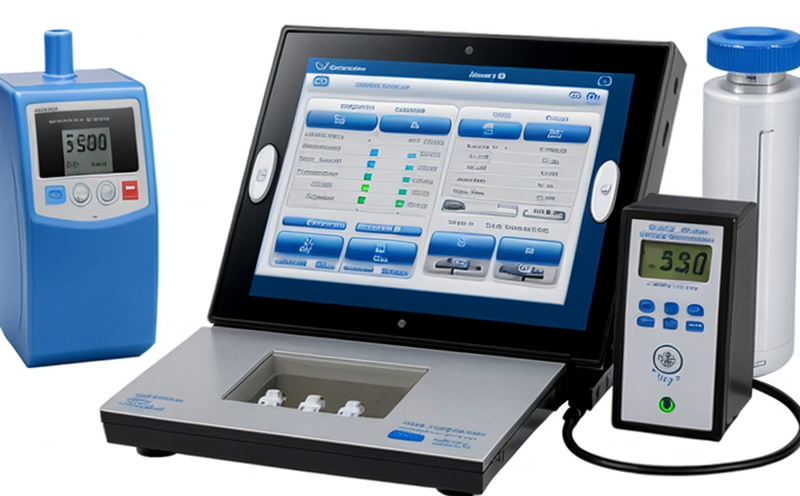Data Integrity and Transmission Testing in Drug Delivery Systems
Data integrity and transmission testing are critical components of ensuring that medical devices, particularly those involved in drug delivery systems like infusion pumps, accurately and reliably deliver medication to patients. This is especially important given the potential risks associated with inaccuracies or failures in these systems.
Infusion pump systems are designed to provide precise dosing of medications over time, minimizing the risk of underdosing or overdosing. Ensuring that data integrity and transmission accuracy are maintained throughout the lifecycle of these devices is essential for patient safety. This testing ensures that the software algorithms responsible for calculating drug delivery accurately reflect the intended medical protocol.
The primary goal of this testing is to verify that all data inputs, processing steps, and outputs related to the drug dosing process remain accurate from start to finish. This includes checking against real-world scenarios where the pump must deliver medications under various conditions such as temperature fluctuations, power interruptions, or varying patient needs.
Data integrity testing typically involves validating that the system can handle all expected data inputs correctly without altering them in any way. Transmission testing focuses on ensuring that the data is sent accurately and reliably from one component of the system to another, whether it's from the user interface to the pump controller or between different parts of a multi-pump network.
These tests are conducted using rigorous methodologies designed to replicate real-world conditions as closely as possible. The testing may include simulating various operational scenarios including normal use cases, edge case situations, and unexpected events such as power outages or communication failures. Compliance with international standards like ISO 13485:2016 for quality management systems in the medical device industry ensures that these tests are conducted consistently across different manufacturers.
The importance of data integrity cannot be overstated when dealing with drug delivery devices because even minor discrepancies could lead to serious health risks. For instance, if a pump fails to accurately transmit or record dosage information, it might result in incorrect medication administration leading to adverse effects on the patient's health.
Testing methods often involve monitoring various aspects of the system including its ability to process commands correctly, store data securely, and communicate effectively with other devices within the network. By adhering strictly to these standards, manufacturers can demonstrate compliance while also providing assurance that their products meet high safety and efficacy levels required by regulatory bodies worldwide.
Accurate testing is crucial not only during product development phases but also throughout manufacturing processes where changes or modifications might occur. Regular audits and verifications help maintain consistency across batches ensuring long-term reliability of the final product.
Scope and Methodology
Data integrity and transmission tests for drug delivery systems cover a wide range of parameters that ensure accurate operation under diverse conditions. The scope includes verifying data accuracy, ensuring secure storage of critical information, validating command execution, confirming proper communication between components, and assessing recovery mechanisms in case of errors.
- Data Accuracy: Testing whether the system correctly interprets commands and executes them as intended.
- Secure Storage: Ensuring that all relevant data is stored securely without corruption or loss.
- Command Execution: Verifying that every command sent to the pump is processed accurately.
- Communication Protocols: Checking the reliability of communication between different parts of the system, including user interfaces and controllers.
The methodology employed involves setting up controlled environments where various scenarios can be simulated. These include normal operational conditions as well as extreme cases that might occur in real life situations such as power outages or network interruptions. By simulating these extremes, developers can identify potential weaknesses early on in the design phase and address them before releasing the product.
Testing methods also encompass monitoring performance metrics like latency, throughput, error rates, and recovery times after failures. This helps establish benchmarks against which future improvements can be measured. Compliance with international standards ensures consistency and reliability across different manufacturers producing similar products.
Why Choose This Test
Data integrity and transmission testing are vital for ensuring the safety and efficacy of drug delivery systems used in healthcare settings. By choosing this type of testing, companies can significantly enhance their product's reputation by demonstrating adherence to stringent regulatory requirements and industry best practices.
Certifying compliance with relevant standards such as ISO 14971:2016 (Risk Management for Medical Devices) provides confidence among stakeholders that the device meets necessary safety criteria. This certification not only protects patients but also helps protect manufacturers against liability issues should there be any malfunction during use.
Moreover, rigorous testing ensures that all critical functions operate correctly under all expected circumstances. It allows developers to identify and rectify potential flaws before they become significant problems in clinical settings. Early detection of these issues minimizes risks associated with product recalls or malfunctions once the device is deployed.
Data integrity tests also help maintain consistent quality across different batches produced during manufacturing processes. Regular audits and verifications ensure that even minor adjustments made during production do not compromise overall performance or reliability of the final product. This consistency contributes to building trust among healthcare providers who rely heavily on accurate drug delivery systems for patient care.
Choosing this type of testing is essential because it provides valuable insights into how well your device performs under various conditions. It allows you to make informed decisions about design changes, component selection, and manufacturing processes based on actual test results rather than assumptions or guesses.





